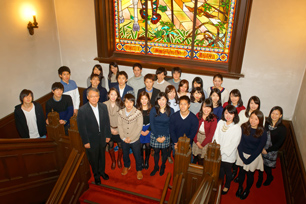Yoshihide Soeya, Professor, Department of Political Science, Faculty of Law
Knowing where you and Japan stand in the world
In my seminar class, there are 15 to 20 students from each grade conducting research with a focus on linkage between international politics and Japanese diplomacy. Based on a foundation of trust, the seminar class provides an accommodating and comfortable environment for each individual student.

There are two main perspectives when discussing Japan in the context of the world: the first is to view the world from a Japanese perspective; and the second is to have a bird’s-eye view of Japan from outside. From time to time, with the former, we tend to base our perspective on Japanese values and “common sense” and become critical of other countries; and with the latter, there is a tendency for people to problematize Japan as being unique in the world. Isn’t there a way to find a happy medium? This is an important question my seminar class is seeking to answer by looking into “the linkage between international politics and Japanese diplomacy,” and I try to guide my students to think about Japan in relation to the rest of the world.
The way students think about Japan in the world boils down to the way of thinking at the individual level. Indeed, the questions about the revision of Article 9 of the Japanese Constitution, or about the Japan-U.S. alliance and the presence of the US military in Japan may appear to be deeply related to the values and ways of thinking of each person. They, however, were in fact born within a structured environment created by changes in international politics such as the post-war occupation of Japan and the intensification of the Cold War, which were intimately connected to the shaping of Japanese politics.
It is quite easy to imagine that every one of us would have different opinions on politics and diplomacy, if we had been born and raised in another country such as China, for example. If one rethinks international politics and Japanese diplomacy in this way at the level of the individual, it should be clear that “empathy” is absolutely essential for building trust between countries, which also motivates students to learn more about other countries and international relations.
These are the things I encourage my students to bear in mind in conducting research as well as interacting with other students. Our basic policy is very simple. I would like my students to express their individuality openly and freely. But, I don’t tolerate people who take concomitant responsibility lightly. Valuing yourself is respecting and being considerate of other people’s individuality as well. I have taught this seminar for 24 years, and have seen quite a few students come and go. All of my students, with self-awareness and an open attitude, created for themselves a learning environment which they would cherish for many years after graduation.
Student’s Voices
Yudai Tanaka
Fourth-year student, Department of Political Science at the Faculty of Law (at the time of writing)
Being Independent and Balancing Tasks
Based on the seminar’s principle of “freedom and responsibility,” we all struggled during the first half of the junior year to complete weekly reading assignments and essays. In the second half of the junior year, students work on the joint research project for the Mita Festival, and we all complete graduation theses in the senior years. There are many students in my seminar class that are actively involved in extracurricular activities such as being a member of an athletics club and organizing international symposiums. Nonetheless, all of us work on our research projects assiduously, reminding ourselves of the professor’s words: “Taking on multiple tasks is putting your heart and soul into everything without making any compromise.” My classmates have strength of character and they do not alter or modify their own opinions easily. Through passionate debates in which well-thought-out opinions and ideas are knocked against each other, however, we put our all into making our joint research paper (for the Mita Festival in the junior year) as good as it can be. With our professor encouraging us to be independent and my classmates who are juggling multiple tasks, this seminar class is definitely intense but very enriching.
*Position titles, etc., are those at the time of publishing.
